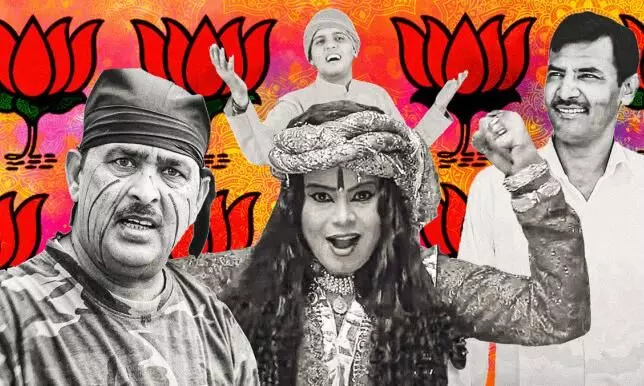
YouTube auto-generates 'Hindutva Pop' music calling for the expulsion of Muslims from India
text_fieldsYouTube, one of India's top music streaming platforms, is reported to have been hosting and generating extremist music videos under the genre known as ‘Hindutva Pop’, featuring Hindu supremacist symbols accompanied by lyrics advocating violence against Muslims.
According to a report published on www.bellingcat.com, the genre associated with the right-wing extremist ideology of Hindutva aims to establish India as a Hindu nation-state. It is being proliferated, in violation of YouTube's policies against promoting violence or hatred based on religion, reaching young audiences across the country.
The controversial songs often include references to leaders of the BJP, the Hindu nationalist ruling party in India. One example is the song titled "Jab Tak Hindu Rakt Hai Yogi Ji Har Bar Ayenge," which translates to "Yogi will come to power till Hindu blood runs in our veins."
The song allegedly explicitly promotes violence, with lyrics like "We will write Jai Shri Ram with streams of blood," invoking the Hindu deity Ram.
YouTube, in response to the revelation, has attributed the content to its automated system, stating that it generates videos at scale for audio tracks provided by record labels and distributors. However, this automated approach has allowed hateful content to slip through the platform's content moderation system.
Bellingcat, a research group, identified 114 videos across 54 channels, generated for songs promoting discrimination and violence against Muslims in India. These videos have a combined view count of over 5.4 million, and YouTube is running advertisements on them.
Despite YouTube's claim of strict policies against hate speech, many of these videos carry explicit titles with hateful or violent messages.
The issue extends beyond content moderation as it also involves YouTube's business relationships. Sangam Dhun, a prominent music label and distribution company, was found to be a major contributor to the controversial videos. The company is owned by Dharmendra Shukla, the national president of a Hindu nationalist organization that supported the BJP in state elections.
Critics argue that YouTube's content moderation priorities are skewed, with more resources devoted to English-speaking markets, while languages like Hindi, where the content is spreading hate, receive less attention. The platform has long faced criticism for its failure to adequately remove harmful content, particularly in languages other than English.
The revelation comes at a time when the issue of online hate speech has gained global attention. A shareholder's proposal submitted to Alphabet, YouTube's parent company, demands an explanation of how content moderation risks, especially concerning vulnerable groups, are being addressed.
The proposal specifically highlights instances in India and Sri Lanka where online hateful content has led to targeted violence against minority groups.
As the controversy unfolds, questions are being raised about YouTube's responsibility to tackle hate speech on its platform and whether its current measures are sufficient.
The impact of such extremist content is evident in instances where violent acts, fuelled by music, have erupted in different parts of India. The story sheds light on the urgent need for improved content moderation systems and greater transparency in dealing with hate speech on online platforms.























